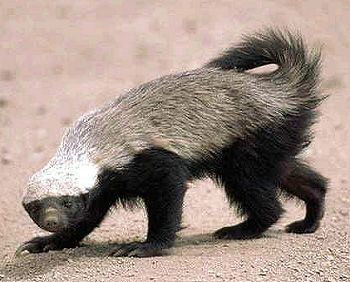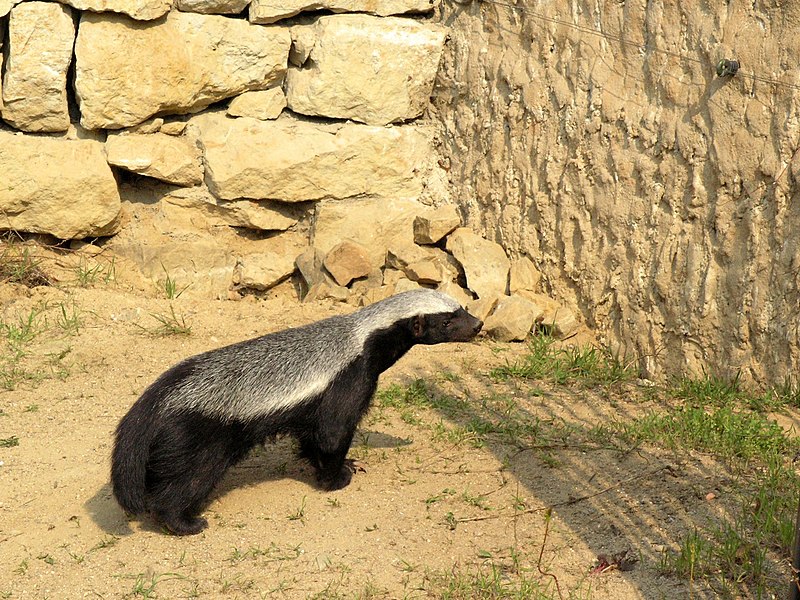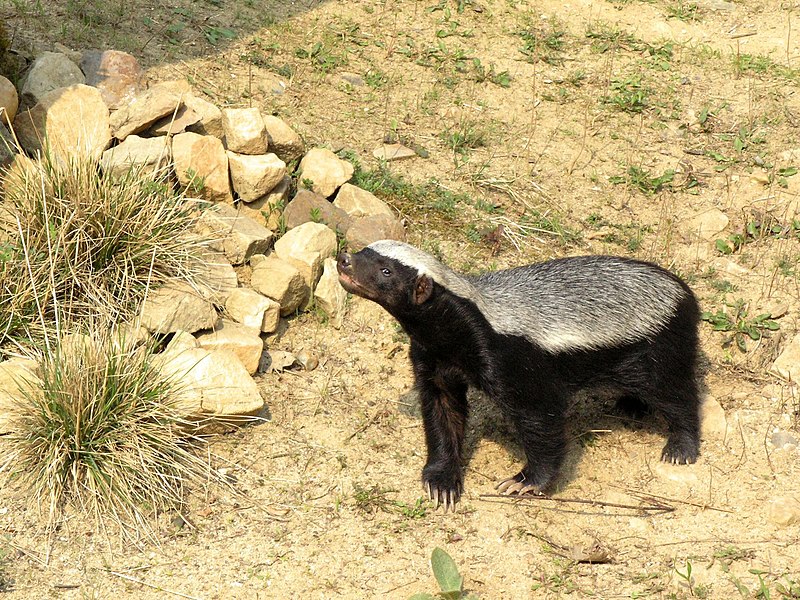.
The most fearless Animal in the world
Has a sweet tooth
Has a sweet tooth
And the acutest sense of smell
On the savannah
On the savannah
The honey badger
So courageous nothing
Dares prey upon it
Degree of difficulty
In attacking a honey badger
Extreme
Reward minimal
The honey badger is skilled with tools
A honey badger will log-roll
And stand delicately balancing
On its hind legs
On the spinning log
To patiently extricate
With its scimitar claws
A kingfisher fledgling
From the dark ceiling
Of a subterranean cave
To the honey badger
The world is an hors d'oeuvre
Solitary and nomadic
Roaming a 300 mile radius
Thinking
Eat
Intelligent and playful
Loved by some
Dreaded and feared by others
The honey badger has a curious idea of fun
In Basra it is known
A honey badger will kill you
Not in order to eat you
But in order to tear
Off your testicles
Honey badger: photo by Jaganath, 2006
Mellivora capensis (Prague Zoo): photos by Matej Bat'ha, 2007








10 comments:
Tom:
I was in Solano Park'n Shop last night, at the meat counter, and the guy measuring out my bacon said he was distracted by his "honey-do list"--something I'd never heard before. Then this other checker is wandering by, and says, out of the blue, "boy, I'm booked up, got my 'honey-do list'" etc. So I ask "what's this 'honey-do' business you guys are always talking about. And then, snap, I get it, it's their wives giving them lists of stuff to do.
If the honey-badger wants my balls, he'll have to fight me for'em, cause I ain't finished with'em yet.
Ha ha! Oh my! To read such this early in the morning has surely woken me up!And too, to read Mister Faville's comment. I smile.
I do like how your words tell a tale. The 'Honey Badger' has such a sweet name and yet.....like some humans I am thinking.
SarahA,
Yes, I am thinking the same thing. Only the honey badger is probably not quite THAT bad.
Curtis,
It's rumoured that that emporium retains the custom of the overdomesticated by transplanting honeydew melons into their cranial recesses.
The thing about the honey badger is that disrespect of your family jewels would be merely all in a day's work and without a by-your-leave. A honey badger once even bit Richard Attenborough; now there's ingratitude. And there is the story of the honey badger named Kleinmann that pilfered the scheduled lunch of a venomous puff adder. While the honey badger was tucking in, the puff adder showed up and threw a hissy fit that reverberated all the way across the savannah. In the ensuing affray the honey badger ate the puff adder (a honey badger is capable of swallowing a 15 foot python in 15 minutes, a mere puff adder is but an appetizer), but the puff adder, in its last gasp, stung the honey badger... which appeared to drop dead. For about two hours. Then it popped up like Lazarus, or a cartoon character, and went nonchalantly on its way toward its next meal, or the next set of unguarded testicles (one delicacy, come to think of it, that honey probably don't get at that emporium?).
Tom, this is one elegant creature. What great photos with your poem: thanks.... Dale
Dale,
The independent, intrepid, nomadic, indomitable nature of this creature seems unique. There is credible lore attesting to the fact people have befriended them and indeed interacted with them as, shall we say, friendly acquaintances if not exactly pets. Then again there is no mistake about the reputation of the honey badger as the meanest animal alive. Anything that will attack, kill and swallow a python three times its length and at least equal to it in weight has to be pretty much undaunted by anything and everything. It seems not only pythons and venomous snakes, but wolves, bears, lions, leopards know the score about honey badgers; at any rate it has been observed that they keep a healthy distance. And so the honey badger survives. I suppose there's a bit of the raccoon attitude -- in order to continue to exist in this world I must never allow myself to fear it. Though of course even a raccoon, attitude or no, would probably represent to a honey badger nothing more than the next meal on the horizon.
I seems the biggest threat the honey badger faces is its own taste for sweet things. It is inexorably drawn to bee hives, Farmers know this and so enclose their hives in traps. The honey badger caught in a hive trap is usually stung to death before the farmer has time to show up with the gun.
By the way Dale,
I had a hunch that, as a possum egoist, you'd like these interesting critters. When I think of the terrible struggle an urban opossum has to survive more than a few months, I can't help imagining how interesting it would be if every opossum were assigned a honey badger as a sort of Guardian Angel companion. "Hi, meet my new friend!"
Anthropomorphically speaking
I knew a human honey badger in the
civil rights movement: quite
diminuitive for a bar room brawler/
Gay Street in Baltimore/the main
Black drag/His MO....sit on the floor in the middle of the bar
and challenge anyone to a fight with him in that starting position/
The story was he never lost/The
unsung Bad Bad LeRoy Brown/enobled
by Martin Luther King/ He participated in non-violent civil
disobedience/One time when the
Klan was going to possibly be our
opposition....I said to him, that'll be interesting and he said
"Who's gonna stop them...You Charlie?"
Charles,
Every true poet has probably needed a Honey Badger for protection, at least once.
A poem about my favorite animal! That's a treat. Thank you!
Regarding honey badgers and humans: there are several accounts of orphaned honey badgers raised by humans, including a memoir titled Wild Honey by the owner of private game reserve in Zimbabwe named Bookey Peek. (This is not Ms. Peek's first book about a close relationship with an unlikely animal. Her previous memoir, All The Way Home, describes her raising of and subsequent friendship with a warthog.) Even though she raised the honey badger from an unweaned cub, many of its wild traits were ineradicable. Once "Badge" was old enough, he sought outdoor burrows for sleep, killed his own food (although even mature he was not above accepting food from the Peeks—or raiding their refrigerator, for that matter, chocolate being a favorite target), and would dismantle or destroy any inanimate object that held the prospect of an interesting interior. Still, he was extremely affectionate and loyal toward Ms. Peek and her family, indulging in play and cuddling with them even once he could feed himself with deadly snakes and other standard staples of the honey badger's diet. It must be strange and wonderful to have an animal in your life that would gently embrace you and rest content in your arms after making a meal of King Cobra that he killed.
There seems to be nothing to honey badgers castrating or genitally mutilating prey or attackers, however. The zoologist couple of Keith and Colleen Begg, whose study of the honey badger began with four years of field work following fifty badgers in the Kalahari, found no evidence of the behavior. Their website, www.honeybadger.com, is excellent. They are also responsible for the creation of "Badger Safe" honey in South Africa, providing South African bee keepers with low cost, permanent alternatives to traps: bee keepers do not have to fear honey badger depletion of their stocks without injuring or even restraining badgers.
Lovely to hear the tale of Bookey Peek and Badge the Honey Badger. To those who take on the complicated learning process involved in keeping company with such a creature, there must come unusual rewards (on both sides of the exchange).
I could not help recalling Gavin Maxwell's wonderfully moving account, in A Ring of Bright Water, of his adoption of and subsequent relationship with a river otter named Midge.
Midge came to a sad ending, but Maxwell bravely (and perhaps a bit unwisely, as it turned out) then took in an even more unlikely house mate: a bush baby.
(That did not end well, but, again, there was some learning involved, evidently all on Gavin's side, and cautionary.)
Post a Comment